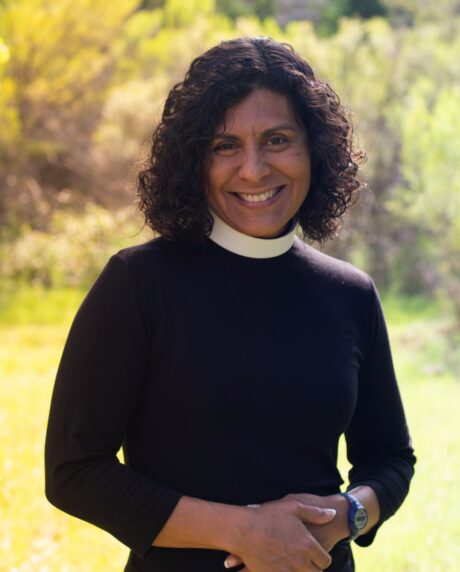
The Rev. Minerva Camarena Skeith was born and raised in the border town of Laredo, Texas. She is bilingual in English and Spanish and worked for more than 20 years with diverse lay leaders as an organizer and leader with the Industrial Areas Foundation.
She is currently the rector of St. John’s Episcopal Church in Austin and writes about a new effort to develop leaders in the changing communities surrounding the church.
With the help of the Episcopal Health Foundation, St. John’s Episcopal Church in Austin has started a relationship with Central Texas Interfaith. Central Texas Interfaith (CTI) is a non-partisan, multi-ethnic, multi-issue coalition of 50 religious congregations, schools, unions, and civil organizations. CTI teaches congregations how to identify new leaders and train leaders on how to work together to address public issues and make positive changes that affect the well-being of families and neighborhoods.
St. John’s sits in between the two halves of Austin: the haves and the have-nots. The neighborhood has gone through significant changes. On the east and south side of St. John’s, people are struggling to make ends meet. It has one of the highest crime rates in the city, and the vast majority of students who attend two elementary schools live in low-income households. To the west and north of the church, new high-end housing and retail developments have brought in people with higher incomes to an established middle-class neighborhood.
EHF supports congregations who are interested in creating healthy communities. St. John’s, with the training and mentoring from CTI organizers, plans to learn how to address the pressures facing our community. New development in the area is driving up housing prices, making it more difficult for middle and low-income people to keep up with increased property taxes and continue to live in the neighborhood. The school nearest to the church, situated along a high-speed street, does not have a safe crossing area. There is a growing homeless population who often use the church as a place to clean up and rest. And, St. John’s parishioners who are new arrivals from other countries are looking for an institution that can shepherd them out of the shadows and into fuller participation in community.
We have begun our congregational development work with CTI by doing individual meetings and attending training on how to lead “house meetings” – small group conversations. St. John’s leaders are learning how to identify new leaders and what they are passionate about. We will begin our listening campaign mid-October with Spanish speaking parishioners and continue growing our leadership team. The goal is to have a leadership team that will develop an agenda of issues based on the many conversations that will be held with our parishioners and our neighbors. This team will be responsible for developing strategies to put St. John’s priorities into action.
Working with CTI allows St. John’s to draw upon decades of institutional organizing experience in identifying and developing people to more effectively work with public officials to bring about needed changes for a safe and vibrant community. We are excited to see the development of our parishioners into effective leaders of change and the development of a healthier community for all of our neighbors.